NEW YORK JEWISH WEEK — Lucy Schwob and Suzanne Malherbe, under their pseudonyms Claude Cahun and Marcel Moore, earned belated recognition in the past few decades for the startling photographs, collages and writings they created in the cutting-edge art world of 1920s Paris. As lovers and collaborators they left a body of surrealist work prescient in its gender ambiguity and shape-shifting, and earned fans ranging from rock star David Bowie to artist Cindy Sherman.
Author Jeffrey H. Jackson would also like them to be recognized for another role: As residents of Jersey, the largest of Great Britain’s Channel Islands, the two French women carried on a campaign of resistance against the Nazi occupation. In “Paper Bullets: Two Artists Who Risked Their Lives to Defy the Nazis,” Jackson describes how over four years they wrote subversive leaflets, pamphlets and drawings meant to demoralize the German soldiers who controlled the island. Slipped into soldiers’ pockets, pasted on walls and left even in graveyards, their homegrown propaganda “highlights the variety of ways in which people fought the Nazi empire across Europe.”
Jackson is professor of history at Rhodes College in Memphis, Tennessee. He and I — two heterosexual cisgender males — spoke about the nature of resistance, the utility of disinformation and his subjects’ ability to cross gender, religious – and enemy – lines.
Both women were born shortly before the turn of the century, and grew up in well-off families in Nantes, before coming to Paris and diving into the avant-garde.
Lucy’s father was a newspaper owner and editor and her mother was a famous actress, and Suzanne’s father was a physician. When they come to Paris right after World War I, yes, they dive into the art world, where they already have some connections.
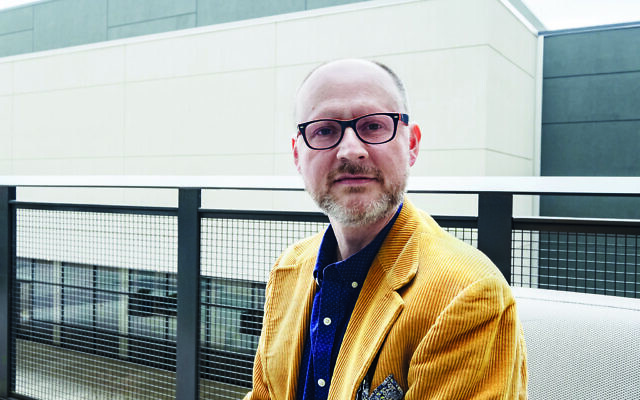
Jeffrey H. Jackson, author of ‘Paper Bullets.’ (Algonquin/ via New York Jewish Week)
Their lives and art are marked by fluidity – in their sexuality, in their names, in their identities. I imagine this has a lot to do with their same-sex relationship in a very different time.
Their families knew each other and they played together as young girls. As teenagers their romantic relationship starts. They don’t speak a lot about it but it is clear that, as you might expect in this period, an early 20th century provincial society, it is not an easy thing.
When they move to Paris, things are more open and there are lesbian couples like Gertrude Stein and Alice B. Toklas but even there it is a challenge. A lot of people were critical of both gay men and women, accusing them of not doing their duty to have more children and build back France’s army. Even in the art world a lot of their surrealist friends, like Andre Breton, were homophobic or not accepting.
After vacationing in Jersey over the years they eventually decide to move there full time. What is the status of the Channel Islands before the war – they were British-controlled territories that would have welcomed French citizens like Lucy and Suzanne?
They are crown dependences and are defended by the British military and use British currency, but they do have their own self-governing bodies. It’s a well-established vacation spot for people in Britain, and a tax haven, so it has a kind of intermediate status.
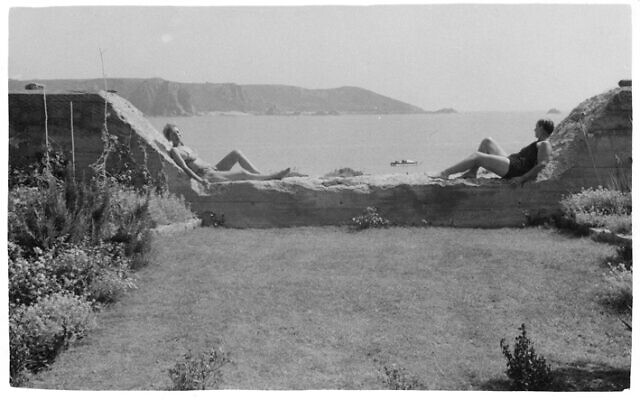
Lucy and Suzanne reclining at the water near their home in Jersey. (Jersey Heritage Collections/ via New York Jewish Week)
And when the Nazis begin to march, Churchill decides they are not worth defending?
It wasn’t a shrug, but he decides “we don’t have the resources to defend you.” The British army was already being taxed and about to be evacuated from Dunkirk. And the military asked why the Germans would come there in the first place. They didn’t believe it was much of a target, until the Germans used it as part of their “Atlantic Wall” defensive strategy. They also thought by leaving the islands undefended the Germans wouldn’t see them as a target. Unfortunately, they forget to tell the Germans it wasn’t defended, and they do drop bombs and strafe the island, which is the beginning in 1940 of a traumatic occupation.
Could Suzanne and Lucy have left?
They considered leaving, but they don’t really know where they’ll go and what they’ll do. Lucy thought they might return to France and join the Resistance, but Suzanne, always the more practical one to Lucy’s dreamer, asks what they would do. Eventually they decide to hunker down but Lucy continues to think of ways to resist the Germans and Suzanne gets drawn in by Lucy’s passion. Lucy had the passion and Suzanne had the organizational skills. They needed each other.
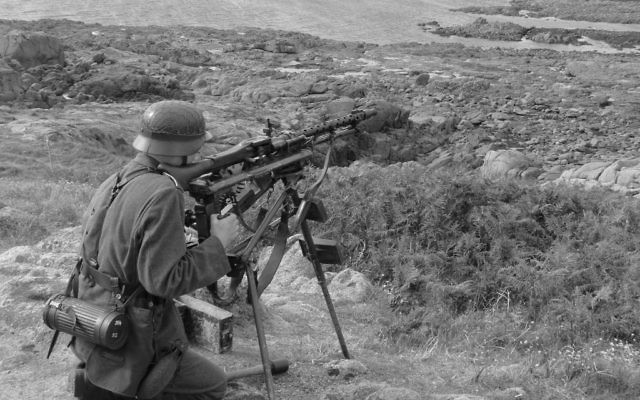
Illustrative: A German soldier guarding the Atlantic Wall in the Channel Islands during WWII. (Getty images/iStock)
Lucy’s father was Jewish, and as an artist she took a Jewish name, Cahun. Did her Jewish background prepare her to resist?
Crucial to this story is the Dreyfus Affair. Lucy grew up in the heat of this powerfully anti-Semitic moment [when Alfred Dreyfus, a Jewish officer in the French artillery, was tried and convicted on false charges of treason].
There were crowds outside their family home chanting, “Down with the Jews,” because her father had known Dreyfus in school, and his newspaper was pro-Dreyfus. She saw the toll it took on her father. Her mother was already descending into mental illness. It was a stressful childhood. Suzanne mentions it under interrogation. Even though she was not Jewish, it helps frame their resistance. It gives them additional motivation. Fascism and anti-Semitism is not new to them when they see Mussolini and Hitler on the rise.
Did the Germans ever find out about her background?
Only because Lucy admits it under interrogation, saying “I am on my father’s side of Jewish origin.” She does that because she is trying to take the fall for Suzanne, to convince the Nazi interrogators that she alone has the motive to write all these notes.
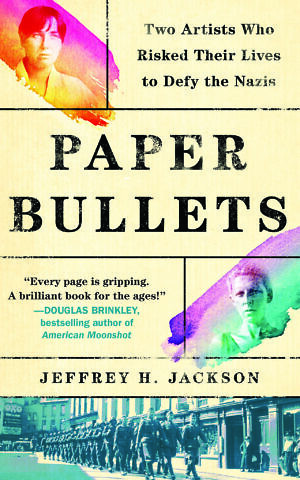
‘Paper Bullets’ by Jeffrey H. Jackson. (Algonquin/ via New York Jewish Week)
About those notes: In the winter of 1941, Lucy and Suzanne begin banging them out in the voice of the “Soldier with No Name,” a sort of Everyman who tries to convince his fellow soldiers that they were fighting in a useless, losing cause. You write that Lucy identified with their creation in ways familiar from their artwork, in which she is often depicted as a man, or in character, or as sexually ambiguous.
There is a direct line between how they play with those categories in their photographs and how they reinvented themselves as a German soldier and used the German language to get inside the mind of the soldiers who are reading their notes.
A lot of their notes are funny or sarcastic, some are more blunt, or appeal to home and family. The soldier they invent has a personality. Lucy says at one point that “I feel like becoming him and escaping.” She often had a desire to become someone else.
Lucy and Suzanne fight the occupation with the tools they knew best: art and literature. Did their various leaflets, poems and satirical notes have the intended impact on the morale of German soldiers?
It would be great to have some German’s diary saying, “I found the note and feel so demoralized.” They do meet some soldiers in prison who had read their notes. One in particular did desert and went to their house, already taken over by the Germans, and their maid Edna hid him there for a few days.
But to me in some ways the better evidence is that they are hunted for four years. The GFP, the Nazis’ Secret Field Police, took it seriously and would not have if not for the fact that this had the potential of significant impact on morale. The German command was not brushing them off as the work of disgruntled civilians. And it was significant that they were writing to Germans in their own language – and ultimately they were sentenced to death.

German soldiers standing at an intersection in Jersey during the WWII occupation of the Channel Islands. (Bundesarchiv Bild)
Do you think they endangered others on the island – either in their household, or maybe by inciting the Germans to root out Jerseyans who were resisting?
In some ways I think they did – everyone in their household was breaking some regulation. They had a radio, which was outlawed. Edna the maid and her husband George all listened to the illegal radio. They were hoarding food. George worked in the hotel across the street, which had been converted into a German officers’ social club, and he was stealing food. Such low-level resistance often happens in wartime under occupation. There were a lot of people circulating through jail for these kinds of offenses.
Under interrogation, Lucy and Suzanne insisted that they worked alone. They didn’t want to endanger anybody else.
In what other ways was their rebellion personal or tied up in their sexuality and art?
I talk about them as lifelong resisters. Once they in their teens begin their relationship and artistic collaboration — Lucy would write and Suzanne would illustrate – it was always in opposition to the world around them. I think there is a through line. You don’t wake up and say, “I am going to become a resister!” More often it comes out of the lives of people who almost have been preparing for that moment their whole life. They had a kind of ability and skill set to enter into that resistance. That’s where you see them visualizing an alternative world where gender is not this stable reality, or where surrealism is playing with what the eye sees.
Lucy and Suzanne are eventually imprisoned, tried and convicted by a Nazi tribunal for their violations of the occupation – hiding a radio and a typewriter, distributing their subversive writings. It’s a kangaroo court, but a court nonetheless. Why would the Nazis go to the trouble of setting up the appearance of a justice system?
There is always the veneer of legality that has to be wrapped around this. The judge even says something like that: “Our goal is not to find you guilty, but to determine just how guilty you are.” The other reason is that this is occupied territory, and they needed to keep the peace on this strategically important island. They needed the civilian population to work for them. And people on the island did go along with it. They needed to eat and continue a regular life. That’s the dance of occupation – each side needs the other. A legal system has to function even if it is rigged toward the occupier.
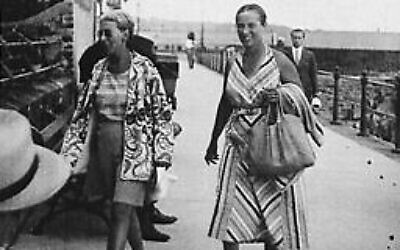
Lucy, left, and Suzanne, after moving to Jersey, would often obscure their true relationship by saying they were sisters. Lucy’s divorced father had in fact married Suzanne’s widowed mother. (Jersey Heritage Collections/ via New York Jewish Week)
Lucy and Suzanne were fighting against this occupier. What were they fighting for?
Lucy talks about this a little bit, although some of her stuff is so abstract. She sees herself fighting for a world that is free of imperialism or suppression of individual freedom – that goes back to her own experience as part of a lesbian couple and having to navigate the complexities of that.
She also talks about this idea of self-liberation – of helping men liberate themselves. They see the German soldiers as having been duped by Hitler and duped by the Nazis, hence these men are a kind of victim too. Lucy and Suzanne’s brothers and cousins fought in WWI, and they say to their prison guards, “We aren’t afraid because we know soldiers.” They see a kind of humanity there. They see themselves fighting for a more humane world.
They see the German soldiers as having been duped by Hitler and duped by the Nazis
The war ends before their jailers could carry out the death sentence. After the war, the two wanted recognition as members of the French Resistance, but they were denied the full honors because their activities weren’t military in nature. This must have been a deep disappointment.
They don’t talk about that disappointment but certainly they applied for the greater honor. And they suffered for their actions during the war. Their experience in prison is not a story of brutality and torture, but definitely there was psychological violence. Every day they expected it to be the day they would be executed. They lived with that for eight months. They did not expect to survive the war.
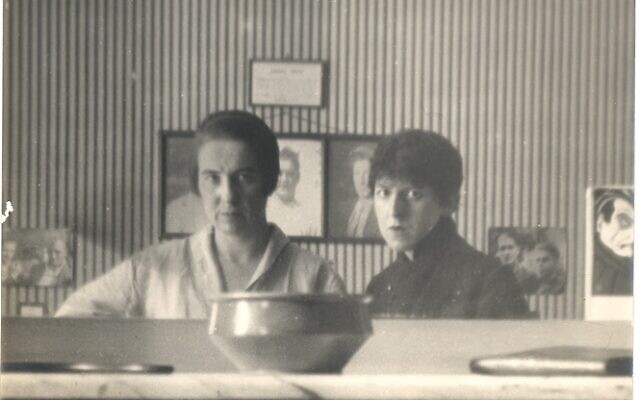
As part of the Paris avant-garde of the 1920s, Suzanne Malherbe, left, and Lucy Schwob created subversive, gender-bending art under the pseudonyms Marcel Moore and Claude Cahun. (Jersey Heritage Collections/ via New York Jewish Week)
Lucy died in 1954, at age 60, and Suzanne died in 1972. You write that the two were buried together on Jersey, under a headstone that includes stars of David, and I saw that there was a street named after them in Paris. Are there traces of Lucy and Suzanne as resisters in Jersey and elsewhere?
The Jersey Heritage trust has done a lot to promote them and their war-time activities. In the last 15 or 20 years, as their artistic personalities have become more well known in the art world, there have been exhibitions helping to preserve that legacy. Many of their papers are digitized by the Trust. Last year The New York Times wrote about Lucy as part of their forgotten obituaries series [in which her war-time activities weren’t mentioned].
The house is still there, with a plaque on it with Lucy’s name as Claude Cahun, when really both should be credited. I believe their entire body of work was collaborative.
Related posts:
Views: 0
 RSS Feed
RSS Feed

















 December 12th, 2020
December 12th, 2020  Awake Goy
Awake Goy  Posted in
Posted in  Tags:
Tags: 
















